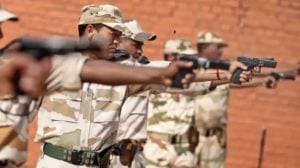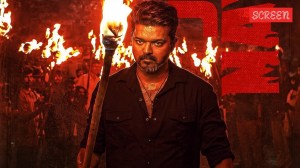The cleansing campaign
The images are desperately familiar. So is the West's fudge and fiddle. Old women in black winding their way through mountainous terrain. De...

The images are desperately familiar. So is the West8217;s fudge and fiddle. Old women in black winding their way through mountainous terrain. Dead men. Smoke billowing out of a single house lost in the wilderness. Kosovo is burning. Western leaders are furious. They begin their usual waltz through each others8217; capitals. The sound bites are right. NATO is working out plans.
Same words. No-fly zones, electronic warfare, smart strikes against Serb forces and bombs dropping on Serbian airfields. Looks good. The plan on paper. Never mind if no one dares ask what the strikes are actually supposed to achieve.
Yugoslav President Slobodan Milosevic now, as then, is having the last laugh. During the Bosnian war, Milosevic was enemy number one as he slaughtered Muslims in Bosnia and ethnically cleansed areas in the Balkans.
Then, he turned around and became champion peacemaker as his nod was necessary to clinch the Dayton accords that ended the war in Bosnia. He had won. On paper and on the ground. Now he is cleaninghis own country driving ethnic Albanians out of the Serbian province of Kosovo.
Switzerland. United States mediator Richard Holbrooke zips in and out of a Swiss mountain resort where he has just concluded a meeting with some Kosovars. He warns that Kosovo could become the flashpoint for a new war in the Balkans. Hoolbroke, credited in the West for having ended the Bosnian war, spent five hours talking to Milosevic.
NATO wants to intervene. Russia says back off. The West is edgier than ever. Ignored by Milosevic, it is in a quandary.
The European Union threatens, cajoles, urges Milosevic to stop his forces from killing ethnic Albanians.
They can8217;t support calls for an independent Kosovo as that would make nonsense of the West8217;s no-change-of-frontiers policy in Bosnia. Wednesday brings news and images of more violence, more deaths, more people trundling their way out of Yugoslvia8217;s Kosovo province where Milosevic8217;s men are bashing civilians. Talk of intervention intensifies.
Intervene. It looks easy.On television screens. This time around, the Serbian strongman is beating up not his neighbours as he did some years ago, but his own people. The question, however, is on everyone8217;s lips. What are the arguments for intervention? If NATO intervenes, would it not constitute an attack on a sovereign government that could claim that it was protecting its territorial integrity against an unlawful uprising?
If NATO gets away with it this time, what is to prevent the world8217;s warmongers from foisting the same scenario selectively in other parts of the world including on Kashmir? The record is hypocritical. For instance, why did the world not feel the urge to intervene in East Timor some 200,000 dead, Rwanda 800,000 dead and Chechnya 100,000 dead? There are calls for United Nations-backed action. Something very dangerous could happen in Kosovo setting international precedents.
That could explain, at least in part, the dragging of feet over what to do in Kosovo. For sure, Russia and China would oppose anyintervention blessed by the UN Security Council. If Milosevic8217;s attacks on his own people were not bad enough, the West, but most obviously the US, is fishing in troubled waters by backing the separatists.
Ethnic Albanians outnumber Serbs nine to one in Kosovo, a province in southern Serbia. Serbia and Montenegro now make up what remains of Yugoslavia. Serb forces have been shelling villages in Kosovo. Holbrooke says he is frustrated that 16 Kosovo Albanian political parties have not rallied behind moderate Ibrahim Rugova to lead proposed talks with Milosevic.
Rugova is a moderate because he has eschewed violence. The militant Kosovo Liberation Army KLA on the other hand is prepared for a bloodbath if that can secure independence. For now, the West has pinned its hopes on Rugova.
The six-nation Contact Group comprising experts from the US, Russia, France, Italy, Germany and UK have stopped demanding the Serbs to withdraw from Kosovo because the KLA has stepped up violence. The US, Russia and otherEuropean powers now oppose independence for Kosovo and instead want autonomy talks to commence.
But Milosevic and Russia say the KLA is a terrorist organisation and want it out of any future talks. Diplomats say it remains far from clear what the major powers want from the Serbs. If Milosevic is to be persuaded to end the repression in Kosovo, he will in return want a guarantee that the West would not support rebels seeking to split Kosovo from Serbia nor recognise a self-proclaimed independent Kosovo. The West knows that Milosevic is not used to keeping promises. Worse maybe in store of the Kosovars caught in this international roulette.
For the next few days at least, the World Cup will shield external peacemakers hoisted on their own petard, from ridicule. Next week, everything will look different.
- 01
- 02
- 03
- 04
- 05































